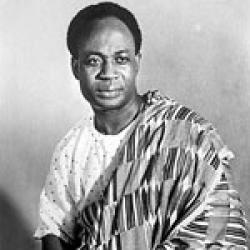
Published date
9 September 1962
In 1949 Kwame Nkrumah formed the Convention People's party (CPP). After his 'positive action' campaign created disturbances in 1950, Nkrumah was jailed, but when the CPP swept the 1951 elections, he was freed to form a government, and he led the colony to independence as Ghana in 1957.
A firm believer in African liberation, Nkrumah pursued a radical pan-African policy, playing a key role in the formation of the Organization of African Unity in 1963. As head of government, he was less successful however, and as time passed he was accused of forming a dictatorship. In 1964 he formed a one-party state, with himself as president for life.
On 9 September 1962 a little girl was killed and several people were injured when a bomb blast exploded in Kwame Nkrumah's official residence, in the capital city, Accra, Ghana. At the time of the attack, Nkrumah's official residence, Flagstaff House, was filled with close to 2000 guests who were celebrating Kwame Nkrumah's escape from a first assassination attempt in October. The attempt was blamed on a new anti-Nkrumah organisation, the Kumasi Command, as a result, many militants throughout the country were arrested in order to calm down the growing opposition against Kwame Nkrumah's government, which had rejected multiparty rule in favour of one party rule and "scientific socialism".
Nkrumah was later overthrown by the military in 1966, with the help of western backing, he spent his last years in exile, dying in Bucharest, Romania, on 27 April 1972.
References:
Mercer, D. (1998). Chronicle of the 20th Century: The Ultimate record of our times, Dorling Kindersley: London, P 885.
Biography of Kwame Nkrumah [online], available at: .africawithin.com [accessed on 04 September 2009]